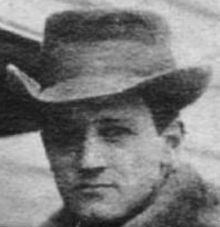Anton Dilger (doctor)
Anton Dilger , pseudonym Alberto Dondo (* 13. February 1884 in Front Royal, Virginia ; † 17th October 1918 in Madrid ) was a German-American physician and one of the foremost proponents of the use of biological agents in the First World War .
Career
Anton Dilger was born in the USA to German parents, but was sent to Germany at the age of 9. He attended grammar school in Bensheim , studied medicine in Heidelberg and Munich and then worked in Heidelberg at the surgical university clinic. His doctoral thesis on the development of animal cells in tissue cultures was awarded summa cum laude in 1912 .
At the beginning of the First World War, Dilger was called up by Germany after allegedly working as a surgeon in the Bulgarian army during the Balkan War . In 1915 he returned to the USA due to a faked nervous breakdown and carried anthrax and snot cultures with him on behalf of the German government , which were to be used as biological weapons . So the supply of live animals for the Allied forces should be impaired.
Together with his brother Carl, Anton Dilger set up a laboratory in Washington, DC , in which the bacteria Bacillus anthracis and Burkholderia mallei were propagated. A report from 1941 revealed that the pathogens were intended to be smeared on the nostrils of horses , which were still widely used during the First World War. In fact, stevedores recruited by German officers are said to have injected solutions with the bacteria into an unknown number of horses in the port of Baltimore , protected with rubber gloves. However, it is unclear whether the act of sabotage was successful.
These German acts of sabotage were broken off at the end of 1916 when Anton Dilger temporarily returned to Germany. After returning to the USA, he was suspected of being a German spy, so that he fled first to Mexico and later to Spain , where he lived under the code name Alberto Dondo and in 1918 fell victim to the so-called Spanish flu . His activities only became known from German files later. Anton Dilger is buried at the Cementerio nuestra Señora de la Almudena in Madrid.
The effects of the sabotage attempts are still unknown today. Apparently there are no reports of any relevant disease outbreaks among animals. It is also not known whether the cell cultures were infectious at all. It is also noteworthy that the provisions on disarmament in Germany after the First World War did not contain any specifications regarding biological warfare agents. From this it can be deduced that these sabotage attempts were still unknown to the Allies at the time or that they could not see them as a serious threat.
In a 1999 study on biological weapons, Erhard Geißler confirmed in principle the activities of the Dilger brothers in the USA on the basis of an analysis of German interrogation protocols from the early 1920s, but came to the conclusion that Carl Dilger could possibly be ascribed an important role.
literature
- Erhard Geißler: Biological weapons - not in Hitler's arsenals. Biological and toxin weapons in Germany from 1915 to 1945. Lit-Verlag, Münster 1999
Web links
- Literature by and about Anton Dilger in the catalog of the German National Library
| personal data | |
|---|---|
| SURNAME | Dilger, Anton |
| ALTERNATIVE NAMES | Dondo, Alberto (pseudonym) |
| BRIEF DESCRIPTION | German-American doctor, advocate of the use of biological warfare agents in the First World War |
| DATE OF BIRTH | February 13, 1884 |
| PLACE OF BIRTH | Front Royal, Virginia |
| DATE OF DEATH | October 17, 1918 |
| Place of death | Madrid |
